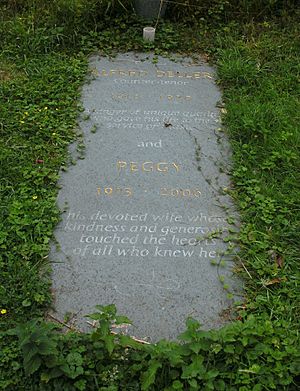Alfred Deller facts for kids
Quick facts for kids
Alfred Deller
|
|
|---|---|
| Born |
Alfred George Deller
31 May 1912 Margate, Kent, England
|
| Died | 16 July 1979 (aged 67) Bologna, Italy
|
| Resting place | All Saints' Church, Boughton Aluph, Kent, England |
| Occupation | Countertenor |
| Years active | 1940–1979 |

Alfred George Deller (born May 31, 1912 – died July 16, 1979) was an English singer. He helped bring back a special type of male singing voice called the countertenor. This voice was popular in older music from the Renaissance and Baroque music periods. People sometimes called him the "godfather of the countertenor."
When he sang songs with a lute (an old string instrument), he used a style that was new and daring at the time. He would change the speed of the music (called rubato) and add his own musical decorations. Now, many singers use this style. Deller was also important in bringing back early music. He was one of the first to perform this music using "original instruments" from the time it was written. He shared this music with many people through his shows on the BBC. In 1962, he started the Stour Music Festival, which became a very important early music festival.
Contents
Alfred Deller's Life and Singing Career
Early Life and Church Music
Alfred Deller was born in Margate, a town by the sea in Kent, England. As a boy, he sang in his local church choir. When his voice changed as he grew older, he kept singing in a high voice. He eventually became a countertenor.
From 1940 to 1947, Deller worked as a singer at Canterbury Cathedral. After that, he joined the choir at St Paul's Cathedral in London, where he sang from 1947 to 1962.
Becoming a Solo Singer
Alfred Deller became a solo singer because of the composer Michael Tippett. Tippett heard Deller sing at Canterbury and loved his unique voice. Tippett helped introduce Deller to the public as a countertenor.
Deller became even more famous after a radio show on the BBC in 1946. He sang in Henry Purcell's Come Ye Sons of Art. He focused on making English Baroque and Renaissance music popular. This included music by composers like John Dowland and Purcell.
Deller's Singing Style
For a long time, the countertenor voice was mostly heard only in all-male church choirs. Deller's voice sounded very high. Many people did not understand the countertenor voice when Deller first became famous. Once, a French woman heard Deller sing and thought he was a eunuch. Deller famously replied, "I think you mean 'unique', Madam."
The Deller Consort Music Group
In 1948, Deller started a music group called the Deller Consort. This group focused on performing music exactly how it would have been played when it was first written. They recorded music from as far back as the 13th century. They also helped people discover more Baroque music. The group performed old and true versions of works by Johann Sebastian Bach, George Frideric Handel, Purcell, and Dowland. They even sang traditional folk songs.
The singers in the Deller Consort changed over the years. Alfred Deller's son, Mark Deller, joined the group in 1964.
Working with Other Musicians
In 1960, Deller sang the role of Oberon in the first performance of Benjamin Britten's opera A Midsummer Night's Dream. Britten wrote this part especially for Deller. Deller later recorded the opera with Britten conducting in 1967.
Deller also worked with many other talented musicians. These included the lutenist Desmond Dupré and the harpsichordist Walter Bergmann. Later, he worked with lutenist Robert Spencer and harpsichordists Harold Lester and William Christie.
His recordings include lute songs by Dowland, operas by Handel, and songs by Purcell. He also recorded traditional English folk songs and music by Thomas Tallis.
Later Years and Passing
On July 16, 1979, Alfred Deller passed away after a heart attack while working in Bologna, Italy. Deller and his wife are buried in the churchyard of All Saints' Church, Boughton Aluph, Kent.
Deller's Family Life
Alfred Deller married Kathleen Margaret ('Peggy') Lowe in 1937. They had three children. Their oldest son, Mark Deller, became a talented singer himself. He often performed with his father, for example, on the 1972 album Folksongs.
Honors and Legacy
Alfred Deller was given the title of Commander of the Order of the British Empire (CBE) for his contributions to music.
In Canterbury Cathedral, there is a special plaque that remembers Deller and his important work.
On May 31, 2012, All Saints' Church, Boughton Aluph held a concert to celebrate what would have been Deller's 100th birthday. After the concert, the famous countertenor James Bowman planted a tree in Deller's memory in the churchyard where he is buried.
Selected Music Recordings
Alfred Deller made many recordings throughout his career, starting in 1949. He recorded for several record labels, including HMV, Vanguard Classics, and Harmonia Mundi.
Some of his well-known recordings include:
- Shakespeare Songs (1967)
- Folksongs (1972)
- John Dowland Lute Songs (1978)
See also
 In Spanish: Alfred Deller para niños
In Spanish: Alfred Deller para niños
 | Madam C. J. Walker |
 | Janet Emerson Bashen |
 | Annie Turnbo Malone |
 | Maggie L. Walker |

